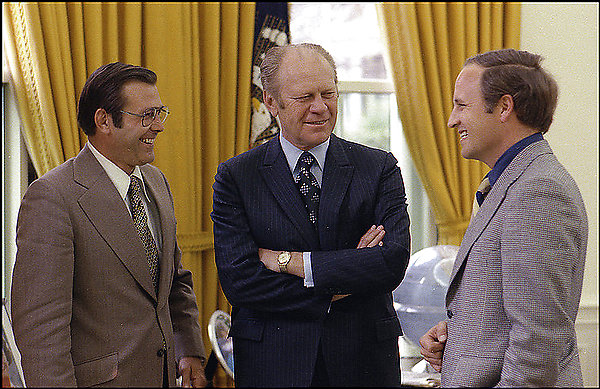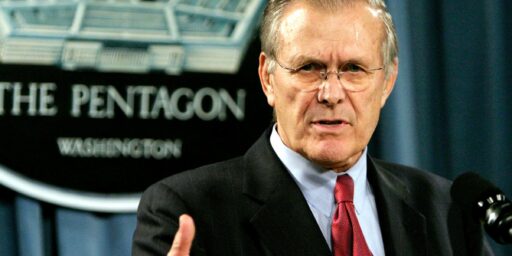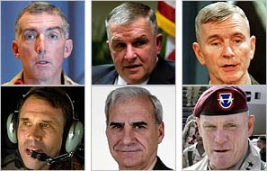Ford Speaks From Grave on Iraq, Cheney, Kissinger
WaPo fronts a Bob Woodward piece airing the late President Gerald Ford’s views on the Iraq War and various public figures, including Dick Cheney, Don Rumsfeld, and Henry Kissinger.

Former president Gerald R. Ford said in an embargoed interview in July 2004 that the Iraq war was not justified. “I don’t think I would have gone to war,” he said a little more than a year after President Bush launched the invasion advocated and carried out by prominent veterans of Ford’s own administration.
In a four-hour conversation at his house in Beaver Creek, Colo., Ford “very strongly” disagreed with the current president’s justifications for invading Iraq and said he would have pushed alternatives, such as sanctions, much more vigorously. In the tape-recorded interview, Ford was critical not only of Bush but also of Vice President Cheney — Ford’s White House chief of staff — and then-Defense Secretary Donald H. Rumsfeld, who served as Ford’s chief of staff and then his Pentagon chief. “Rumsfeld and Cheney and the president made a big mistake in justifying going into the war in Iraq. They put the emphasis on weapons of mass destruction,” Ford said. “And now, I’ve never publicly said I thought they made a mistake, but I felt very strongly it was an error in how they should justify what they were going to do.”
Of course, this is hardly a prescient set of insights sixteen months into the war. By that point, we had known for over a year that the Iraqi nuclear program had been destroyed and that the remaining chemical and biological weapons stockpiles were minimal.
In a conversation that veered between the current realities of a war in the Middle East and the old complexities of the war in Vietnam whose bitter end he presided over as president, Ford took issue with the notion of the United States entering a conflict in service of the idea of spreading democracy. “Well, I can understand the theory of wanting to free people,” Ford said, referring to Bush’s assertion that the United States has a “duty to free people.” But the former president said he was skeptical “whether you can detach that from the obligation number one, of what’s in our national interest.” He added: “And I just don’t think we should go hellfire damnation around the globe freeing people, unless it is directly related to our own national security.”
But, of course, that has long been and remains our foreign policy. There are lots of people living under tyranny that the Bush Administration has made no effort to free, let alone with military force. Saddam Hussein was a longstanding enemy of the United States who was also a brutal tyrant repressing his own people; were he merely the latter, we would not have invaded.
Ford also says that Dick Cheney was a “first class” chief of staff but had developed “a fever” about Iraq and terrorism. Both are likely true. The first Iraq War was the signature event during his tenure as SECDEF under Bush the Elder and the twelve years following its cease-fire were a pretty good indication that the job had been left unfinished. It’s hardly surprising that he was more interested than most in closing the chapter on that. As for terrorism, there was the little matter of the 9/11 attacks.
There are also several paragraphs wherein Ford assesses Henry Kissinger as an insecure prima donna. That’s pretty much conventional wisdom at this point.
In the main, I would prefer that people who held positions of great responsibility, especially former presidents of the United States, to refrain from writing tell-all books and confessing their secrets to the likes of Bob Woodward. That’s especially true if they are going to embargo their remarks until their death. There’s something quite unseemly, even cowardly, about criticizing people you worked with years, even decades, after the fact.





Oil. Israel.
Shoes. Kazakhstan.
Huh? He can’t criticize Dick & Don because he worked with them 20 years ago?
Ugh:
I’m mostly talking about his comments about Kissinger. I don’t take issue with them per se–indeed, they’re likely right–but the timing is wrong. He was, after all, president and could have fired Kissinger if he wasn’t happy. Public criticism from the grave is just not right.
That makes more sense, thanks.
LOL. Too. Cryptic.
Saddam Hussein was the most prominent brutal dictator sitting on tons of oil, threatening Israel. That’s what made him Target #1. James’ point is valid in that the invasion of Iraq was indeed in the interests of the U.S., but James fails to mention precisely what those interests were. Oil. Israel.
Given Kissinger’s record of lying about himself over the past 30+ years, I’m more inclined to give Ford a pass on this one.
But less so on Iraq. JJ may be able to grandly say how obvious all that was, but somehow, I don’t recall the Republicans seeing it that way at the time. An elder statesman like Ford, saying what he thought when he thought it, could have made a difference back when, just possibly, it might have mattered.
As of now, our trajectory in Iraq is, shall we say, ballistic.
James fails to mention precisely what those interests were. Oil. Israel
Y’know, if *I* were setting my Chosen People up in a homeland, I’d put some serious oil reserves under their little strip of coast.
As it is, the Shiites get it all. Even the Saudi reserves are under the Shiite-heavy region.
Food for thought. Allahu akbar!
Anderson: By July 2004, when Ford talked to Woodward, it was pretty obvious that the WMD rationale for the war didn’t fly.
According to the Drudge Report, Ford gave conflicting statements on his support for the war, some for some against. It is kind of hard to ask a dead man.
Personally I don’t think Ford or Carter in their days would have went to war with anyone including Hitler’s Germany. Not only were both pacifist but weak on top of that. During their term as presidents, all they try to do was please everyone. Although I would give Ford credit for all his vetoes.
I supposed Ford wasn’t the one who sent the Marines in to release the Mayaguez hostages, since he was such a pacifist.
Indeed, Ford served as a Navy pilot during WWII. Carter was at the Naval Academy during the war, not graduating until 1947, but he did serve six years after graduation, only getting out because his dad died and he was needed to run the family business.
Alive, it seemed no reporters cared to seek his advice on current affairs.
Now ‘speaking from the grave’ it appears the message is more attractive to the media than the man was.
LJD,
>Alive, it seemed no reporters cared to seek his advice on current affairs.
So LDJ you know this how? Did you serve as Mr. Ford’s secretary for the last 20 years and not tell us?
More likely you are simply making up crap to tarnish the memory of a war vet & former President who served honorably in office, simply because he had an opinion you do not share.
Alive, it seemed no reporters cared to seek his advice on current affairs.
LJD, let me correct your misimpression. When JJ titled his post “Ford Speaks from Beyond the Grave,” that didn’t really mean that no one asked Ford his advice on current affairs until he was already dead.
Rather, Woodward talked to him in 2004, when Ford was alive. It “seemed” no one sought his advice b/c Ford wanted it that way, & told Woodward not to publish.
Regardless, who would have a greater incentive, even obligation, to seek the advice of a Republican ex-president — some journalist, or George W. Bush? It’s the holidays, so I’ll give ya two guesses?
JJ – The WaPo had some good photos of Ford, including him during WWII. Looked like he was working on a destroyer, not as a aviator.
DCL: Looks like we are both wrong. While he was an instructor at a naval aviation school, he wasn’t an aviator. Nor, apparently, did he do destroyer duty:
Naval Service of Gerald Ford
DC Loser
“I supposed Ford wasn’t the one who sent the Marines in to release the Mayaguez hostages, since he was such a pacifist.â€
Ordering a military rescue operation at the end of war doesn’t make one a non-pacifist. Also it seem that the reason he did it was to prevent another incident that could lead to another war.
There is nothing wrong with avoiding a war in general but to avoid it at all cost is. I may be wrong but Ford and Carter struck me as the “avoid war at all cost†type.
Wayne, let’s discuss this another day. President Ford’s body is still warm, so let’s not spoil the tributes being paid to the man in this moment of reflection. There are times to debate a man’s legacy, but this is not one of them.
DC Loser
I have reframe from making many comments on his tribute as with most anybody who dies gets exaggerated. As a person, I think both Ford and Carter were/are good people although age has certainly taken its toll on Carter.
As for respecting the recently decease, I think the MSM bringing his controversial comments about the war forward at this time for political points is being disrespectful. Also people shouldn’t get upset if they start a debate and someone answers. If they think it is improper at this time then they shouldn’t start the debate.
Yikes. Turn down the unsharp mask.
Anjin, Andersen, when will you stop charging these windmills, simply because of who YOU THINK I am? You guys will grasp for anything until the very end, won’t you?
I don’t know where your hallucinations come from, but you have an incredibly tough time with reading comprehension. Let me spell it out:
Until now, where exactly was Ford on the forefront of the ‘everybody thinks the war is wrong’ movement? Nowhere? That’s waht I thought.
Call this what it is, the media making hay out of a dead President’s words to suit their own purposes.
Come to find out now that his ‘opinion’ they reported wasn’t exactly the whole story either. Big surprise there.
>Alive, it seemed no reporters cared to seek his advice on current affairs.
Your words dude. Either stand by them or eat them.
Nobody ever said anything about Ford being on the
“forefront” of the school of thought which said the war is wrong. So you are making up more crap.
But, I can see why you are embarrased by your comments and might wish to cloud the issue…
The picture!! My eyes!! I was sucked back in time!! I was in the Seventies!! MY EYES, MY EYES!!!